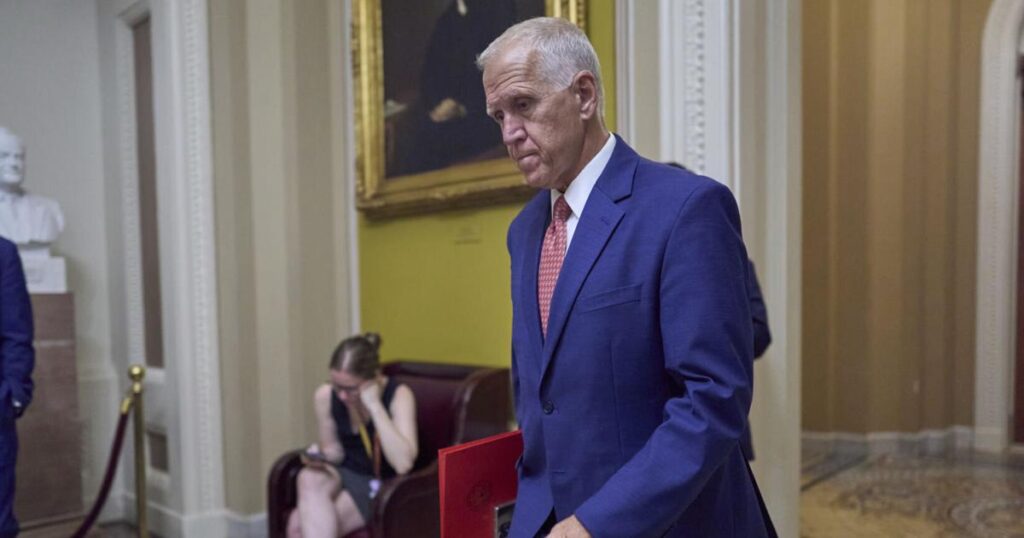WASHINGTON — The list of Republican senators stepping away from their political careers rather than align with former President Donald Trump continues to grow. Sen. Thom Tillis, R-N.C., announced on Sunday his decision not to seek reelection, a move that follows a public clash with Trump over a controversial tax bill. This decision adds Tillis to a notable roster of GOP figures like Jeff Flake, Bob Corker, and Mitt Romney, who have also chosen to step aside.
Tillis’ announcement came just a day after Trump criticized him online, threatening to campaign against him. The senator had expressed his opposition to Trump’s tax bill, citing its significant cuts to Medicaid, which he warned could severely impact his home state of North Carolina. “My goal is not to undermine the president,” Tillis stated to the Associated Press. “But why not do it right? And why not take the time to make sure that we’re not going to have unintended consequences?”
The Political Landscape and Tillis’ Decision
Sen. Tillis, who has served in office for nearly two decades, faced an already challenging reelection campaign. Democrats view North Carolina as a potential gain in their quest to regain control of the Senate. Tillis, who will turn 65 later this year, has been contemplating his future, especially after overcoming a cancer diagnosis. His decision to step aside reflects the broader challenges within the Republican Party, where Trump’s influence remains strong and dissent is often met with political peril.
Most GOP senators who have confronted Trump during his presidency have since exited the political stage. Arizona’s Jeff Flake, Tennessee’s Bob Corker, and Utah’s Mitt Romney, the latter being the only Republican to vote to convict Trump in both impeachment trials, have all stepped aside. Despite these comparisons, Tillis insists his decision is personal. “I don’t like any of the trappings that many senators like up here. I like doing work. I like going home, and I like being with my family,” he emphasized.
Background and Personal Motivations
Tillis’ journey to the Senate is marked by humble beginnings. He recounted his early life living in a trailer park in Nashville and working as a cook at a roadside diner. His experiences shaped his views on economic policies, including his opposition to Trump’s tax bill. “Thom Tillis the waiter gets a tax break. Thom Tillis the warehouse worker doesn’t,” he explained, highlighting what he perceives as the unfairness in the proposed tax relief.
His stance against the tax bill is rooted in a belief that it fails to deliver on promises made to working Americans. “I would love to have told the president this story,” Tillis remarked, criticizing the policy as “gimmicky” and urging a reevaluation to prevent further Medicaid debates.
Conversations with Trump and Future Implications
Sen. Tillis did engage in discussions with Trump, sharing his concerns about the tax bill. However, after Trump’s public rebuke, Tillis suggested it might be time for Trump to “start looking for replacements.” In a subsequent speech, Tillis openly criticized the bill as a betrayal of Trump’s promises, asserting that it would harm those eligible for Medicaid.
His stance has drawn attention from colleagues, particularly Democrats who recall Sen. John McCain’s pivotal vote against repealing the Affordable Care Act in 2017. While Tillis dismisses such comparisons, he acknowledges the challenges of implementing policies that align with Trump’s agenda.
Looking Ahead
As Tillis prepares to leave the Senate, he warns of the consequences of continuing down the current path. “If they continue to do this, I’ll start spending some time focusing on just who those people are,” he stated, hinting at potential future involvement in addressing the party’s direction.
The departure of Sen. Tillis underscores the ongoing tensions within the Republican Party and the challenges faced by those who diverge from Trump’s influence. As the political landscape evolves, the implications of these decisions will likely shape the future dynamics within the GOP.
Stay informed on the latest developments in local and national government and political topics with our newsletter.
About The Author
 Trump Lifts U.S. Sanctions on Syria, Aiming for Regional Stability
Trump Lifts U.S. Sanctions on Syria, Aiming for Regional Stability Lululemon Files Lawsuit Against Costco Over Alleged ‘Dupe’ Sales
Lululemon Files Lawsuit Against Costco Over Alleged ‘Dupe’ Sales Poland Enhances Border Controls Amid Rising Tensions Over Irregular Crossings
Poland Enhances Border Controls Amid Rising Tensions Over Irregular Crossings Gunfire Near NYC Pride Injures Two Teens, Raises Safety Concerns
Gunfire Near NYC Pride Injures Two Teens, Raises Safety Concerns Elon Musk and Donald Trump Clash Over Controversial Tax Bill
Elon Musk and Donald Trump Clash Over Controversial Tax Bill